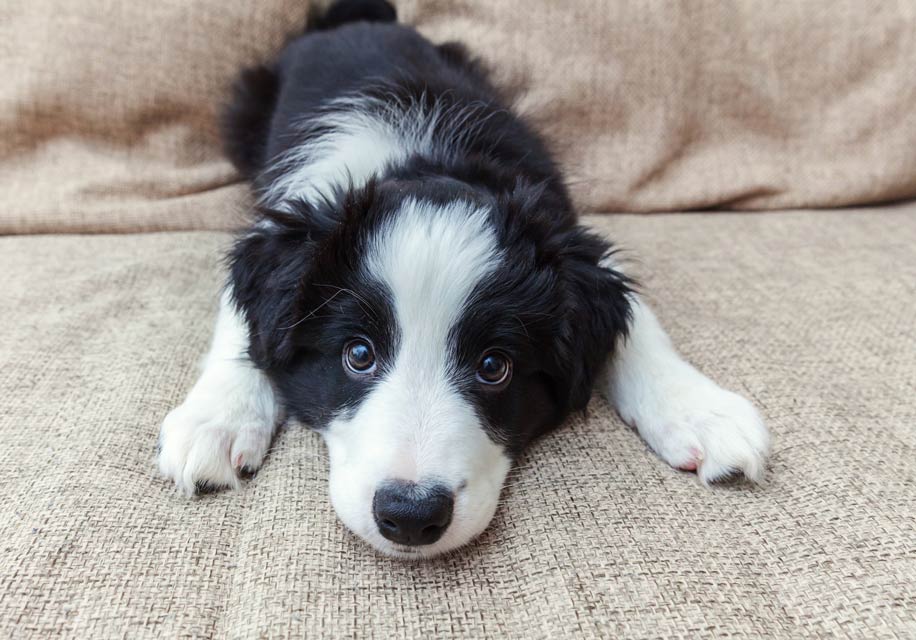Cleft Lip and Palate in Dogs

A cleft palate or lip is a birth defect in puppies. It involves malformation of the lips, bone, and roof of the mouth.
What Is Cleft Lip and Palate in Dogs?
When the roof of the mouth doesn't close properly in a developing puppy before birth, it's called a cleft. The result is an abnormal lip, bone, and roof of the mouth.
Sometimes, part of the upper lip is missing or malformed. The nose may also be affected to a degree, with the top lip being so abnormal that the nostrils appear to be part of the mouth.
There may be a hole in the roof of the mouth of puppies with cleft palates, and those holes sometimes connect to the nasal passages.
Puppies with cleft lips and palates generally can't nurse properly. If it is a severe cleft, the puppy won't be able to get enough milk through nursing to survive.
Causes of Cleft Lip and Palate in Puppies
Usually, cleft lip and palate is suspected to be a genetically inherited condition. Therefore, dogs with the condition should not be bred.
If there is trauma to a fetus during its development, a cleft may be the result.
Certain medications given to the mother dog during pregnancy may result in a cleft lip or palate, including some anti-seizure medications, aspirin, prednisone, and the anti-fungal medication griseofulvin.
If the mother contracts one of a few different viral infections during pregnancy, the puppies may be prone to developing cleft palate.
Signs of Cleft Lip and Palate in Puppies
In puppies with a severe cleft, it will be obvious. The front of the face will appear abnormal, possibly with missing lip.
If the defect is mild, it may be hard to see. There could be only a small abnormality to the lip.
Sometimes the lip is not involved, but there is a cleft defect further back in the mouth, and that can be even harder to see.
Puppies with cleft palates may show the following signs:
- Coughing when eating, drinking, or nursing
- Milk or other discharge from the nose after feeding
- Poor growth
- Sneezing with green or yellow mucous (this occurs if food gets lodged in the nasal cavity)
Aspiration pneumonia is possible if problems chewing and swallowing due to the cleft palate result in food getting into the lungs. Puppies with it may develop a fever, lethargy, and coughing.
Diagnosis of Cleft Palate in Puppies
Cleft palate can usually be confirmed by a veterinarian during a thorough exam. Sometimes, sedation is required to get a good view of the back of the mouth.
X-rays can help determine whether aspiration pneumonia is present.
Treatment of Cleft Palate in Puppies
If the cleft only involves the lip and the puppy is growing properly and is able to eat without an issue, no treatment is necessary. However, if there are signs like those listed above and if the palate is involved, surgery is required.
If possible, the puppy is usually allowed to grow and get stronger before surgery. That may require tube feeding if eating is just too hard for the pup.
Surgery usually requires a specialist and can be difficult. Repairing the defect may require more than one surgery.
If the dog has an infection in the nasal cavity or aspiration pneumonia, other treatment, such as antibiotics and hospitalization, may be required.
You May Also Like These Articles:
X-Rays in Dogs: What Can They Tell Your Vet?
Disclaimer: This website is not intended to replace professional consultation, diagnosis, or treatment by a licensed veterinarian. If you require any veterinary related advice, contact your veterinarian promptly. Information at DogHealth.com is exclusively of a general reference nature. Do not disregard veterinary advice or delay treatment as a result of accessing information at this site. Just Answer is an external service not affiliated with DogHealth.com.
Notice: Ask-a-Vet is an affiliated service for those who wish to speak with a veterinary professional about their pet's specific condition. Initially, a bot will ask questions to determine the general nature of your concern. Then, you will be transferred to a human. There is a charge for the service if you choose to connect to a veterinarian. Ask-a-Vet is not manned by the staff or owners of DogHealth.com, and the advice given should not delay or replace a visit to your veterinarian.



